RV Tornado Safety – How to Prepare for Severe Weather
Experiencing a storm in an RV or trailer can be a truly terrifying situation. In 2020 alone, we found ourselves potentially in the path of a tornado on 4 separate occasions. However, staying prepared and keeping calm can save your life during a storm.
Philip and I grew up in the midwest and are familiar with the destruction and devastation a tornado can leave behind in its path. I can remember several occasions being woken up in the middle of the night and heading down to the basement with my family to ride out a storm. From a young age we learned about tornadoes and how to be prepared.
This post contains affiliate links. If you make a purchase through one of our links we may make a small commission at no extra charge to you. Thanks!
Table of Contents
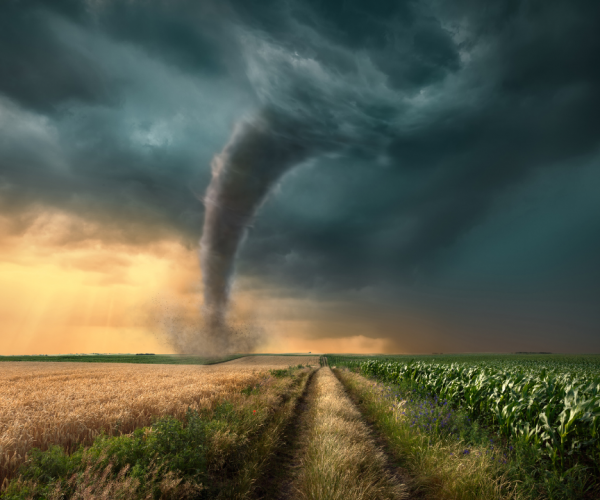
If you’re not from an area that has tornadoes frequently and are planning to travel in your RV, I suggest learning about severe weather that could happen in the area you’re headed! It always amazes me how many people choose to stay in their RV during tornado warnings.
Your RV is the last place you want to be during a tornado!
Know the Signs of a Tornado
First and foremost, know the difference between a tornado WATCH and a tornado WARNING. I cannot stress this enough!
Tornado Watch: Atmospheric conditions are favorable for the development of severe thunderstorms capable of producing tornadoes. The conditions are favorable or expected but not occurring or imminent.
Tornado Warning: A severe thunderstorm has developed and has either produced a tornado or radar has indicated intense low level rotation in the presence of atmospheric conditions conducive to tornado development. Conditions are occurring or imminent.
The way I like to remember the difference between the two is:
Watch = be on the look out/ the conditions could produce a tornado
Warning= a tornado has been spotted/ take shelter immediately
Tornado season is typically considered to be March – June but, this can vary depending on what part of the country you’re in. Part of being prepared involves being able to tell when a tornado is going to develop.
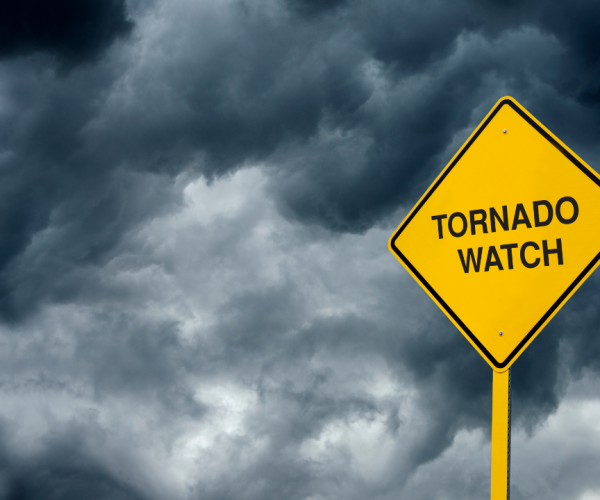
Warning signs that a tornado may develop include:
- Dark Grayish/Greenish Sky
- Large Hail
- Lightning
- Loud Roaring Noise (similar to freight train)
- Visibly Rotating Clouds
- Approaching Cloud of Debris
Have a Plan for Severe Weather
As RVers, we’re among the most at risk groups of people when a tornado strikes. I don’t say this to scare you, but rather to help prepare you incase you find yourself in this situation.
There are a few things we do each time we visit a new campground:
Know Your Exact Location
Aside from knowing what city you’re in, you’ll also want to know what county you’re in too. When the National Weather Service issues a watch or warning, you’ll know if your area is included or not. I’ve seen some RVers put a whiteboard on their fridge and write down important information such as the address and phone number of the campground they’re staying at. This is not only helpful in the event of a tornado, but could also be helpful in other emergency situations too.
Scope Out the Campground
When you arrive and get settled, you’ll want to make sure you’re familiar with the campground. As we’re exploring the campground, we take mental notes of places that could be used to take shelter if needed. Some parks actually may have a designated storm/tornado shelter but we’ve found the majority do not. A basement is the best spot you could hope for but if there isn’t one, you’ll want to look for an inner room or hallway (preferably with no windows). Even taking shelter inside a bathhouse or laundry facility is better than nothing!
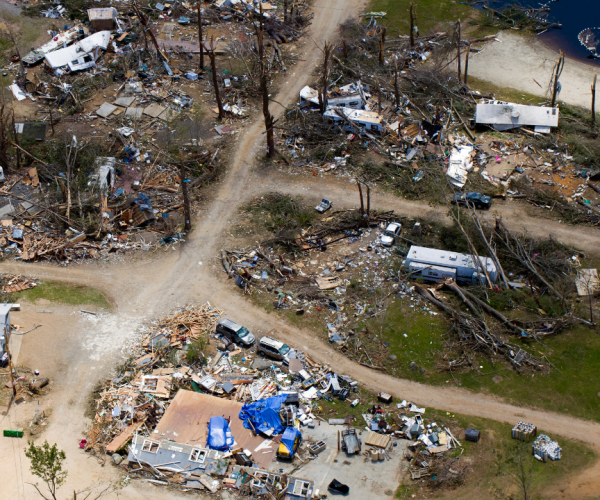
NOAA’s and the American Red Cross’ Recommended Actions
- Monitoring a NOAA Weather Radio. We have one plugged in at all times to give us alerts for our area and we also have the NOAA App on our phones too.
- Be ready to go when a tornado watch is issued. I use this time to start putting on my sneakers and getting the dogs ready to go so that if it turns into a warning we’re ready.
- Put away outdoor items that could become projectiles. If there is time you’ll want to remove items from outside and secure them so they don’t become hazardous. This would include items like chairs, tiki torches, and other lawn furniture. Make sure to bring your awning in too!
- Go immediately when a tornado warning is issued!
- Don’t plan to stay inside your RV! As I mentioned earlier, you want to be on the lowest level possible and stay away from windows!
- Be ready to evacuate to a safe shelter at a moment’s notice. Don’t waste time searching for anything. Grab only the essentials. We always grab our phones, wallet(with ID), keys, pets and we get out!
- Practice your tornado drill periodically. I would say this is especially important if you have children.
In the event that you’re not able to get to a safe shelter, pull in the slide outs (if you have time), and get down in the part of your RV that has the most structure. Crouch down and put your hands over your head and neck to protect you. You can also use blankets or a mattress to cover yourself.
If you’re out on the road when a tornado warning occurs you should try to pull over and seek shelter in a nearby building. Never try to outrun a tornado in your vehicle. If there is no suitable place to immediately take shelter, lie flat in the nearest ditch, ravine, or culvert and shield your head with your hands. Do not take shelter under a highway overpass!
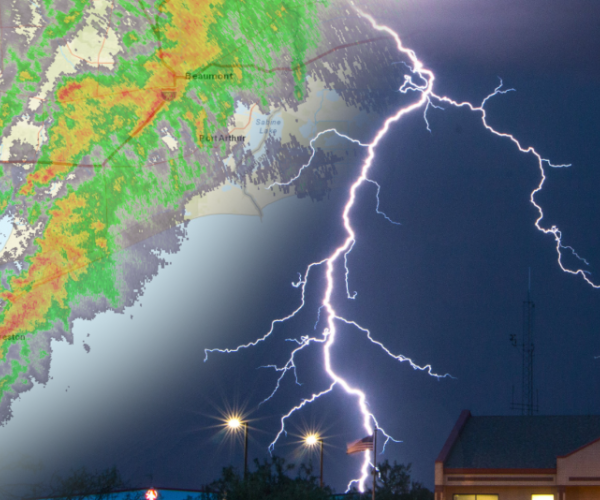
Tools to Help You Prepare
NOAA Weather Radio – The radio we have alerts us to over 60 kinds of weather hazards and emergencies. When a watch or warning is issued, it automatically alerts you.
NOAA Weather Radar Live: Clime App – Both of us have this app on our phones and have notifications turned on.
Tornado: American Red Cross App – What I especially like about this app is that you can monitor specific locations. For instance, we have alerts set up for our families’ locations so we can check on them since we know when something is happening in their specific area.
An emergency go bag – You’ll want to include things such as:
- Medication/prescriptions
- Small first aid kit
- Hand sanitizer/wipes
- Extra pair of glasses or contact lenses
- Phone charger
- Power bank
- LED flashlight
- Rechargeable or hand cranked radio
- Whistle
- Extra clothing
- Water
- Light weight food (think granola bars, crackers or etc) or freeze dried food packs
- Multifunctional tool
You can also buy pre-packed emergency bags and add whatever additional items you need to it. You’ll want to place your go bag in an easily accessible area close to your door so you can grab it and go!
If you have pets you’ll want to also make sure to have dog food, water and poo bags for them too.
Some people also like to include photocopies of important documents (birth certificate, social security, etc). I suggest keeping all your important docs in a fireproof safe if you’re full-time RVing.
Have you ever found yourself in hazardous weather? What do you do to prepare your family for emergency situations?
Stay safe out there on the road!

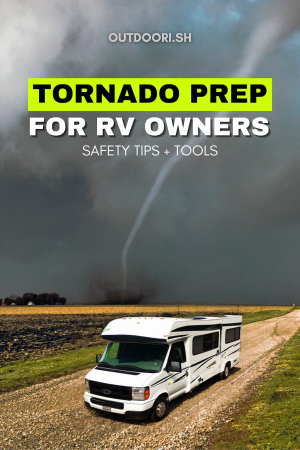
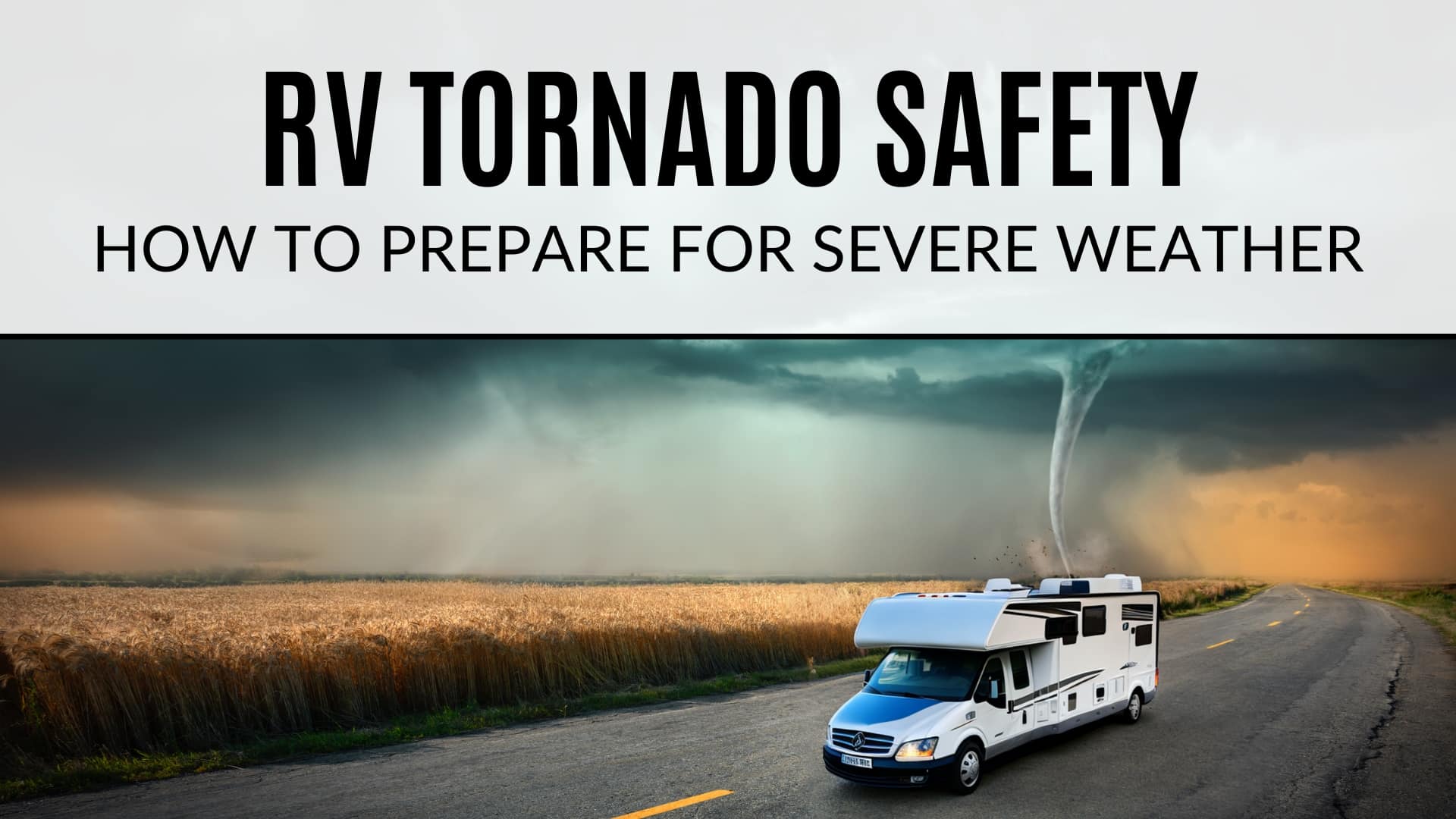
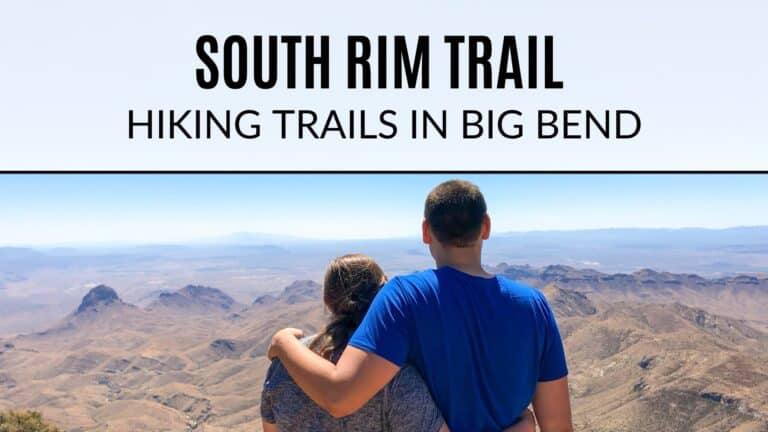
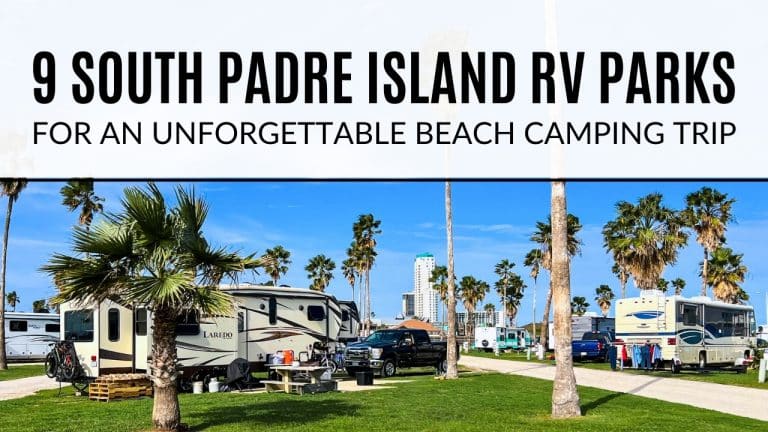
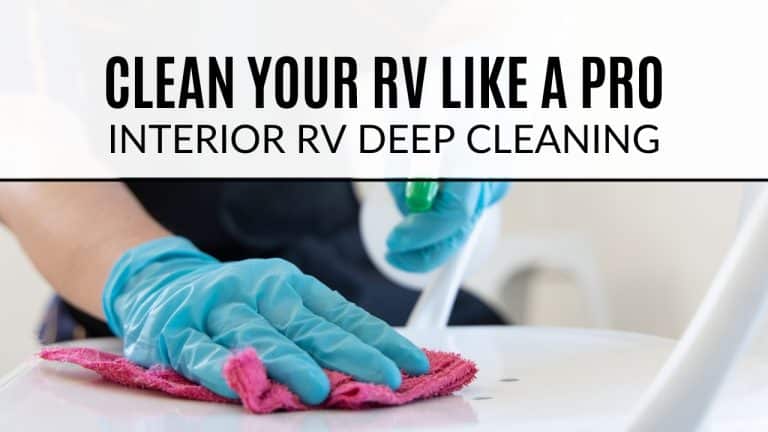
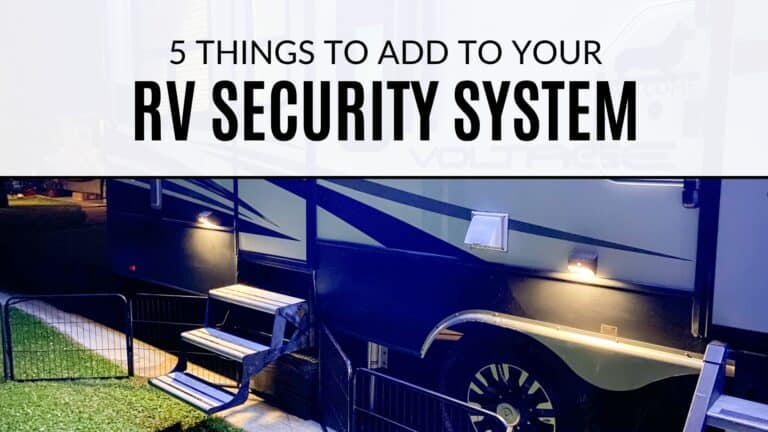
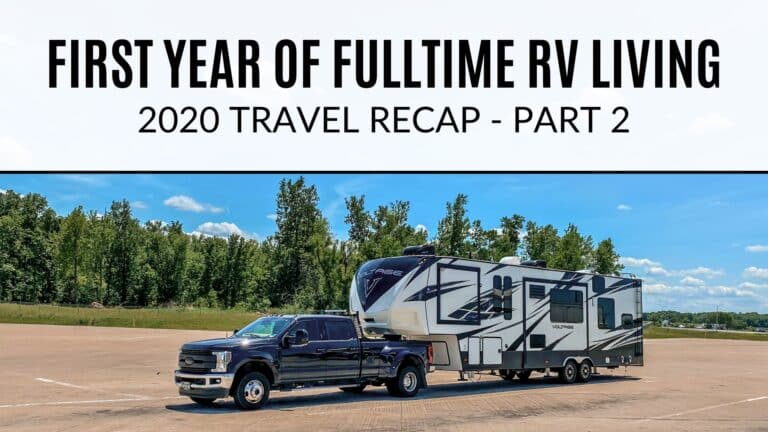

Such a great post Megan! We have found ourselves in some scary tornado situations as well. It’s so important to be prepared! Thanks for sharing 😊
Thank you!! That’s exactly right! It always surprises me how many people just stay inside their RV’s 😳
We had this happen once when we were staying with a friend and only had a laundry room to go to but it felt better then being stuck in the rv😅 so glad y’all were safe and prepared! This was a great read!🙌🏼
Thanks Jodie!! I would gladly take a laundry room over staying in the RV 🙌🏼 even a bathhouse would be okay 🤣
Thank you!! We needed to take the time to read this and it came at the right time. Last night a big storm went through and I thought … we really need to have a plan!
Oh gosh!! Yeah sometimes these crazy storms make me question living in an RV 😬 can definitely be a scary situation
Megan, I so appreciate your helpful RV posts! As a New Yorker now in the west, I feel uncertain about these things and don’t know where to start! You brought me some serious peace. We have got caught in a hail storm once. It was pretty terrifying!! Thankful for this post!!
Great stuff. Read every letter of this. There is no substitute for being prepared and ready. To your list… especially for boon-dockers I would recommend an EPIRB (if it really hits the fan), and it never hurts to have some form of personal protection.
Thank you! And thanks for the additional tip, that’s a good one 👍🏼
Tornados are such a scary thought, especially in an RV. Love this preparation guide to know exactly what steps to take!